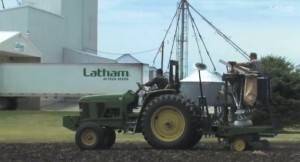 Companies evolve and business practices change, but the one thing that stands the test of time is Latham’s commitment to continual improvement. Willard Latham started cleaning oats for other area farmers and started providing certified oat seed to meet customer needs. He later added soybean seed. In recent years, we’ve extended our product lines to offer a wider range of alfalfa, corn and soybean products.
Companies evolve and business practices change, but the one thing that stands the test of time is Latham’s commitment to continual improvement. Willard Latham started cleaning oats for other area farmers and started providing certified oat seed to meet customer needs. He later added soybean seed. In recent years, we’ve extended our product lines to offer a wider range of alfalfa, corn and soybean products.
When soybeans became the main focus of Latham’s business, greater emphasis was placed on breeding and developing new cultivars. This was done in cooperation with various genetic suppliers so our research testing program would incorporate Latham’s own genetics and germplasm as well as other providers. Tremendous resources were made available, so Latham’s research program could test thousands of new soybeans annually. Our goal is to bring the best possible genetics to our customers across our marketing area no matter where the genetics originated.
Techniques were developed, and trials were arranged in Alexander, Iowa, and at out-lying locations. Personnel was trained and when computers became available, they were quickly integrated into the research system. While our basic philosophy has not changed, there have been some necessary modifications over the years to our research system including:
- Soybean Breeding and Testing: All cultivar crossing used to be done at the Latham Research Farm near Alexander. Because of the many advancements in genome testing and the advent of gene-marker technologies, this work has been outsourced to companies with advanced equipment and expertise.
- Preliminary Trials: Once new lines make it through observation trials, they’re tested in either 2- or 4-row replicated plots. Entries in these trials are limited to products from each specific breeder and advancement out of these trials is determined by yield. Also during this time, maturities and plant characteristics are noted.
- Secondary Trials: The next step after Preliminary Trials is Secondary Trails. These plots are mostly limited to products by each specific breeder but will also include some well-known checks. Advancement is determined by yield plus plant characteristics such as disease tolerances, maturity, Soybean Cyst Nematode (SCN) and Iron Deficiency Chlorosis (IDC) tolerance and plant types.
- Latham Elite Trials: While all of the above practices are common to many seed companies, Elite Trials are unique to Latham. We take the very best products from our various genetic suppliers (including our own) and tests them against each other and against common competitive checks. Products in these trials are tested for yield and other characteristics similar to the secondary trials with an emphasis on overall yield within Latham’s marketing region.
- Super Strip Plots: These side-by-side plots are managed by Latham RSM’s and the Research Team. Planted and harvested by farmer cooperators, Super Strips are another way of testing products in varying environments. Groups are separated by maturity and always include products we’re currently marketing, products that will be marketed the following year plus experimentals that have “graduated” from the Latham Elite trials.
On-farm research conducted in cooperation with our dealers and customers continues to play an important role in our product selection. Latham’s Product Team, comprised of members who live in the areas where these products are being tested, has been working diligently since harvest data became available to analyze and carefully select products. We recently finalized our 2015 product lineup because, as you plant your 2014 crop, we’re growing your 2015 seed. Like you, we’re hoping for warmer and drier soils in the short-term forecast!
